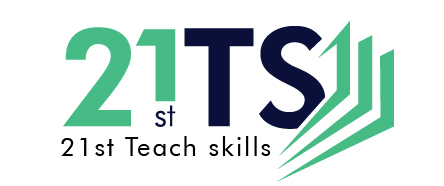Welcome to 21st TeachSkills Project
The Teacher training with specialization on life and information technology skills / 21stTS project offers solutions to the multicultural economy of today’s society, where young people’s horizons are not broad enough to operate accordingly. Challenges, such as the rapid technological advancements and new patterns of work have created several demands on education, making the inculcation of 21st century skills a necessity. The project integrates those skills in the teachers’ educational programs for the teachers to be effective in the 21st century. The project was launched in November 2019 and will be implemented within the next three years.

Objectives

21stTS aims at developing an educational programme which will focus on the most important transversal skills that need to be acquired, such as critical thinking, problem-solving and collaborative working. The project involves a pedagogical method and assessment that focuses on input and role learning. In this way, teachers and educators will need to acquire skills that can help them to align technologies with content and pedagogy. The instructions of educational standards will embody 21st century knowledge and skills, and will use a range of strategies to reach diverse students and to create an environment for the support of differentiated teaching and learning. Finally, the educational programme will use a variety of assessment strategies to evaluate student performance and will guide educators to act as mentors and as peer coaches with fellow educators.
Activities
The principal activity will be to develop a new education programme in higher education institutions’ curricula for teachers and educators. The pre-service and in-service education preparation programs that will aim to enhance teachers’ competences in order to possess and teach 21st skills to students. The teaching/learning activity will include mobility of personnel between HEIs and exchange of best practices for capacity building of the academic staff responsible to teach the programme. The final result is the integration and accreditation of these course packages into the curriculum and the dissemination for transferability of results to the partner organizations beyond the partnership.
Another important activity of the project is the development of new pedagogical approaches for integrating 21stcentury skills in teaching as well as tools for assessment of those skills in classroom that, in that case, consists of an e-toolbox containing best practices that will be used as a practical exercise within the teaching process. The Partnership composed of universities and VETs will develop together these tools that will be used to teach the 21st skills. The final result is the adaptation of the model and its implementation by the participating HEIs. Focus groups of experts in the field and educators will have a key role to test the tools and make it more relevant and concrete.
Moreover, a digital online education platform will be developed in order to share the vision on how ICT can help making lifelong learning a reality for all. The platform will provide opportunities of exchange of teaching experiences among educators in a developed learning community, access to toolbox, and online learning courses. The educational platform will offer a capacity building program for academic staff to enhance adequately their competences.
Finally, there will be development of vocational courses for academics in charge of offering the education preparation program for teachers as well as for the whole academic staff who wishes to be trained in methods based on technological and pedagogical content knowledge.
Target Groups
21stTS project addresses the needs of the following target groups:
1. educators in general who will attend the developed in-service educational programme
a) teachers (primary, secondary, vocational etc.),
b) language teacher trainers,
c) careers officers,
d) educational guides and counsellors
e) headteachers
f) principals
g) managers of schools/organizations offering language education
2. students and fresh graduates from studies relevant to teaching and education
3. academic staff (professors, tutors, lecturers)
Secondary target groups include, among others: educational associations, career counselors, employment services, education policy-makers, and social enterprises.
Both primary and secondary target groups come from the following countries:
- Greece
- Lithuania
- Luxembourg
- India
- China
- Cambodia
